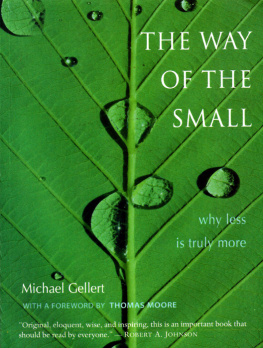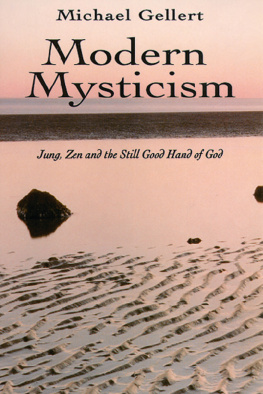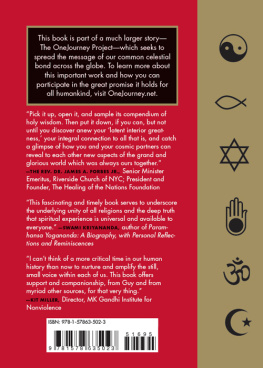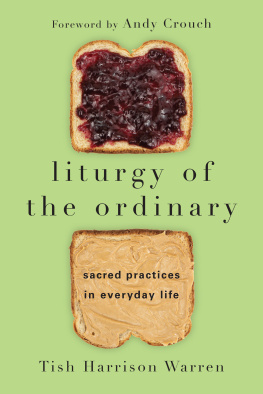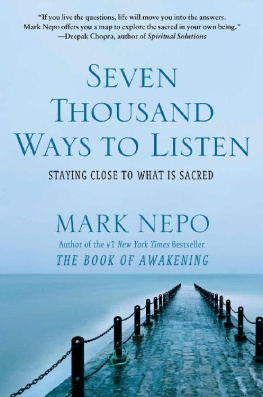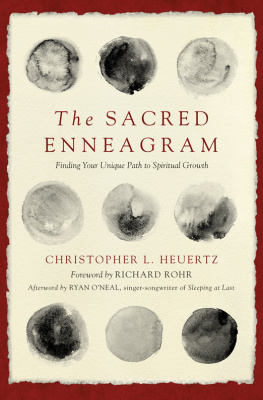ALSO BY MICHAEL GELLERT
The Fate of America: An Inquiry into National Character
Our nation leads the world in the race for ever-increasing technological capacity and excellence. Why is it we are not equally dominant in the race for spiritual excellence? This fascinating, insightful, psychological profile of the American psyche offers answers that both enlighten and stimulate.
MARIO CUOMO
A large-scale analysis of this country on a par with Tocqueville ... an important book. It raises serious questions about our country, makes perceptive observations about our culture, and provokes us to look inside ourselves in a critical, yet constructive, way.
HOWARD ZINN,
author of A People's History of the United States
A broad-ranging, cogently argued, and provocative critique that has taken on a whole new dimension since September 11
LIBRARY JOURNAL
Modern Mysticism: Jung, Zen and the Still Good Hand of God
A psychotherapist writes that rarest of worksa look at the wondrous and mysterious worlds of the unconscious mind, moving from the paranormal to the highest spiritual experience.
SOPHY BURNHAM,
author of A Book of Angels
Gellert takes you with him, into the whales belly and out! An extraordinary experiencenot to be wished for and not to be missed!
DIANE WOLKSTEIN,
author of The First Love Stories
This book is wonderful, as it is both challenging and comforting. I highly recommend it to anyone who is serious about spirituality.
RABBI ARTHUR GROSS-SCHAEFER

The Jung on the Hudson Book Series was instituted by the New York Center for Jungian Studies in 1997. This ongoing series is designed to present books that will be of interest to individuals of all fields, including mental health professionals, who are interested in exploring the relevance of the psychology and ideas of C. G, Jung to their personal lives and professional activities.
For more information about this series, the annual Jung on the Hudson seminars, and the New York Center for Jungian Studies contact: Aryeh Maidenbaum, Ph.D., New York Center for Jungian Studies, 27. N. Chestnut St., Ste. 3, New Paltz, NY 12561-1708, telephone (845) 256-0191, fax (845) 256-0196.
For more information about becoming part of this series contact: Yvonne Paglia, Nicolas-Hays, P. O. Box 540206, Lake Worth, FL 33454-0206, email: .

First published in 2008 by
Nicolas-Hays, Inc.
P. O. Box 540206 Lake Worth, FL 33454-0206
www.nicolashays.com
Distributed to the trade by Red Wheel/Wetser, LLC
65 Parker St., Unit 7 Newburyport, MA 01950-4600
www.redwheelweiser.com
Copyright 2008 Michael Gellert
All rights reserved. No part of this publication may be reproduced or transmitted in any form or by any
means, electronic or mechanical, including photocopying, recording, or by any information storage and
retrieval system, without permission in writing from Nicolas-Hays, Inc. Reviewers may quote brief passages.
Library of Congress Cataloging-in-Publication data
Gellert, Michael.
The way of the small : why less is truly more / Michael Gellert; with a foreword by Thomas Moore.
p. cm.
Includes bibliographical references and index.
ISBN-13: 978-0-89254-129-4 (alk. paper)
ISBN-10: 0-89254-129-6 (alk. paper)
1. Simplicity (Philosophy) 2. SimplicityReligious aspects. 3. Spirituality. 4. Self-esteem. 5. Conduct of life. I. Title.
B105.S55G45 2008
204'.4dc22 2007035671
VG
Cover and text design by Kathryn Sky-Peck
Printed in the United States of America
12 11 10 09
7 6 5 4 3 2
Grateful acknowledgment is made for permission to reproduce the following material: How happy is the little stone, by Emily Dickinson. Reprinted by permission of the publishers and the Trustees of Amherst College from The Poems of Emily Dickinson, Thomas H. Johnson, ed., Cambridge, Mass.: The Belknap Press of Harvard University Press, Copyright 1951, 1955, 1979, 1983 by the President and Fellows of Harvard College. Submitted excerpt from The Man Watching [23 II] from Selected Poems of Rainer Maria Rilke, A Translation from the German and Commentary by Robert Bly. Copyright 1981 by Robert Bly. Reprinted by permission of HarperCollins Publishers. The Guest House, by Jelaluddin Balkhi Rumi. From The Illuminated Rumi by Coleman Barks and Michael Green, copyright 1997 by Coleman Barks and Michael Green. Used by permission of Broadway Books, a division of Random House, Inc. Reprinted also by permission of Reid Boates Literary Agency. The chapter entitled God's Small Secret, copyright by Michael Gellert. was published in an earlier form in Psychological Perspectives, Vol. 48, Issue 1, 2005, Routledge: Taylor &Francis Group, Philadelphia, PA.
www.redwheelweiser.com
www.redwheelweiser.com/newsletter
For Gilda, Betty, and Gary, wayfarers of the small

Many years of work on these matters have completely convinced me not only that small is beautiful but also that small is possible and has the future on its side.
[E.F. SCHUMACHER]
If you fail to seek Cod in the small things, you will seek him in vain for the large things.
[ANDREW MURRAY]
CONTENTS
PART ONE:
WHAT IS THE WAY OF THE SMALL?
PART TWO:
ESSENTIAL PRINCIPLES FOR LIVING SMALL
FOREWORD
by Thomas Moore
I love Mondays. No traveling across the world. No parties and gatherings and events. Nothing but an ordinary day's work, at home, in my precious tiny room.
The life of the writer is odd in that he sits at his desk many hours a day and once in a while discovers that his words have gone out into the far distant world. I enjoy this way of life. I can spend my days at home and yet make a little contribution to the greater community.
In all my books I praise the small and the ordinary. I have a natural antipathy toward spiritual writings that are inflated too big in scope, too focused on universals and ultimates. For years I've been criticized for not speaking of moral absolutes. I have enough trouble sorting out everyday ethical decisions.
I like to write forewords and small essays, even blurbs. I see them as miniatures. A tiny painting or jewel is worth at least as much as a grand wall-sized canvas or a major cathedral or temple.
For years now I have taught at Schumacher College in Devon, England, named for the author of Small is Beautiful. There, I learn spiritual simplicity from my wise spiritual advisor and friend, Satish Kumar. He founded The Small School and the college, which has a limit of twenty-five students per course. He has revealed to me the power of small acts and limited ambitions.
Now I have further wisdom and support from Michael Gellert in this inspired little book about the small and the simple. What I like most about it is the paradox that lies between the words and the covers: learn to live small and you will discover great pleasures. You will accomplish more in your life than you could ever predict if you were overly ambitious.
It does no good to romanticize the small. Once, I was asked to speak at a conference on the small, and, with my usual contrariness, I gave a lecture on the big and huge. I wanted to keep the small from becoming too big. You can overdo something that is almost negligible in size. Sometimes, as soon as you start to rhapsodize on the small, it gets too big.

